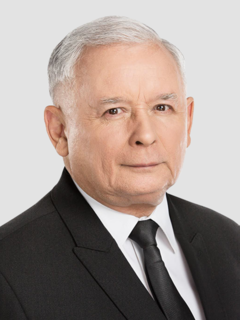Related Research Articles

Jarosław Aleksander Kaczyński is a Polish politician who is currently serving as leader of the Law and Justice party, which he co-founded in 2001 with his twin brother, Lech Kaczyński, who served as president of Poland until his death in 2010.

Gazeta Wyborcza is a Polish daily newspaper based in Warsaw, Poland. It is a Polish left-wing daily newspaper after the era of "real socialism" and one of Poland's newspapers of record, covering the gamut of political, international and general news from a liberal perspective.

Stefan Bronisław Starzyński was a Polish statesman, economist, military officer and Mayor of Warsaw before and during the Siege of 1939.

Stefan Jaracz was a Polish actor and theater producer. He served as the artistic director of Ateneum Theatre in Warsaw during the interwar period (1930–32), and within a short period raised its reputation as one of the leading voices for Poland's new intelligentsia, with groundbreaking productions of Danton's Death by Georg Büchner (1931), The Captain of Köpenick by Carl Zuckmayer (1932), as well as popular Ladies and Husars by Aleksander Fredro (1932) and The Open House by Michał Bałucki.

Roman Zdzisław Wilhelmi was a Polish theatre and film actor, notable for his roles in two of the most popular Polish television series of the 1980s.
Maciej Słomczyński was a Polish translator and writer. For his detective stories he used the pen names Joe Alex and Kazimierz Kwaśniewski.

Marek Koterski is a Polish film and theatre director, screenwriter, actor and playwright.

Karol Juliusz "Igo" Sym was a Polish actor and collaborator with Nazi Germany. He was killed in Warsaw by members of the Polish resistance movement.

Łukasz Trałka is a Polish former professional footballer who played mainly as a defensive midfielder. He made 431 Ekstraklasa appearances for Pogoń Szczecin, ŁKS Łódź, Lechia Gdańsk, Polonia Warsaw, Lech Poznań and Warta Poznań, the 5th most of all players in the league's history. He also represented Poland at international level.

Jan Błoński was a Polish historian, literary critic, publicist and translator. He was a leading representative of the Kraków school of literary criticism, regarded as one of the most influential critics of postwar Poland.

Jerzy Jeszke is a Polish theatre actor and singer, whose considered as one of Poland's most successful theatre actors. From August 28, 2020, Jeszke is serving a three-year jail sentence for the rape of his ex-girlfriend.

Julien Hequembourg Bryan was an American photographer, filmmaker, and documentarian. He is best known for documenting the daily life in Poland, Soviet Union, and Nazi Germany between 1935 and 1939, in the leadup to and early days of the Second World War. He was honored with Zasłużony dla Kultury Polskiej" during his last visit in Poland (1974) for showing the truth about the Invasion of Poland.

Lidia Wysocka was a Polish stage, film and voice actress, singer, cabaret performer and creative director, theatre director and costume designer, editorialist.

Marcin Grzegorz Dorociński is a Polish film, television and stage actor.

Maciej Musiał is a Polish actor, and television personality.

Marian Kociniak was a Polish film and theatre actor, most notable for appearing in the 1970 film How I Unleashed World War II.

Andrzej Adam Zaorski was a Polish actor and cabaret artist, appearing in television, film and theater, as well as on the radio. He was the son of Tadeusz Zaorski, the brother of film director Janusz Zaorski, and the father-in-law of satyrist https://pl.wikipedia.org/wiki/Andrzej_Butruk

Sebastian Fabijański is a Polish film, television and theatre actor.

Witold Sadowy was a Polish film and theatre actor as well as publicist and columnist of the Gazeta Wyborcza daily and Życie na gorąco magazine.

Bartosz (Bart)Staszewski is a Polish filmmaker and LGBT activist. He is the creator of the documentary Article Eighteen, co-founder of the Equality March in Lublin association and the Miłość Nie Wyklucza foundation, which promotes same-sex marriage in Poland. For his activism, Staszewski is a target of death threats and intimidation.
References
- ↑ Wacław Świeżyński (2001). "... Gdziekolwiek jesteś Panie Prezydencie". film.gazeta.pl (in Polish). Gazeta Wyborcza . Retrieved 2010-08-01.
- ↑ "Jack Recknitz nie żyje". Portalfilmowy.pl. Archived from the original on 2016-03-03. Retrieved 2013-04-27.